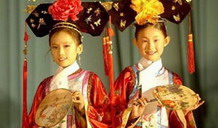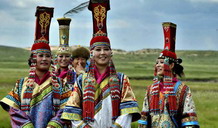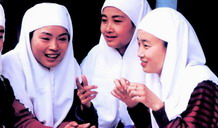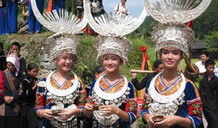China's 56 Ethnic Groups
Each of the minority ethnic groups has a distinctive and different character.
Achang: one of the earliest people in Yunnan; famous for being good at growing rice and forging iron weapons such as cutting tools
Bai: the masters of artistic creativity and favor white clothes and decorations; creative in architecture, painting, music, sculpture and lacquer work
Blang: live in Yunnan Province; mainly practice agriculture; good at planting tea trees and early rice; do many artistic practices such as literature and music
Bonan: live in southwest of Gansu Province; mainly engage in handicraft industry; believe in Islam; play traditional woodwind or stringed instrument
Bouyei: inhabit in Guizhou Province as early as in the Stone Age; advanced in agriculture and forestry; good at brocade and embroidery
Chaoxian: dwell mainly in northeastern part of China; their ancestors are the immigrants from the Korean Peninsula; have similar festivals with Han People
Dai: distribute in southern part of Yunnan Province; a versatile nation who has made certain achievement in music; believe in Southern Buddhism
Daur: a considerably smaller ethnic group who said to be the descendants of Khitan tribe in Liao Dynasty; lay stress upon etiquette; have many taboos of their own
Deang: a small ethnic group distributed in Yunnan Province; they are skilled craftsman, and have profound tea culture; rice, wheat, corn and legume are the staple foods
Dong: living in the border regions between Hunan, Hubei and Guizhou Provinces; skilled in handcrafts; rice, millet, wheat sorghum are the staple foods
Dongxiang: mainly inhabit in Gansu Province, with farming and stocking as their mode of production; believe in Islam; enjoy drinking tea
Dulong: one of the smallest ethnic groups in China; believing that there are spirits who control everything; have two meals a day; carpet is their distinctive handicraft
Ewenki: mostly live in the Inner Mongolia Autonomous Region; good at singing and dancing, horse-racing and wrestling; believe that Gods control their life Gaoshan: most live on Taiwan Island; like singing ballads and telling tales; have rituals for daily activities, such as sowing, harvesting, hunting and fishing
Gelao: an old ethnic group good at the refinement of forging, blacksmith and stonecutting; believe in the bless from many Gods and their ancestors
Gin: most live in Guangxi Zhuang Autonomous Region; make a living on farming and fishing; most believe in Taoism; seafood and rice are their staple foods
Hani: mainly inhabit within the reaches of Yuan and Lantsang Rivers; have interesting marriage custom; believe in the great influence of many Gods and their ancestors
Hezhen: the smallest ethnic group in China; believe in Shamanism and all have spirits and worship as many gods; fish is their staple food
Hui: believe in Islamism; the religious thoughts play important role in their daily life; their life style is very different from other ethnic groups
Jingpo: mainly distribute in Yunnan Province; skilled at carving, painting, weaving and embroidering; believe everything has a soul which will never die
Jinuo: live mainly in Yunnan Province; an old minority who believe in animism; rice and corn are their staple food; the Iron Forging Festival is the grandest festival






